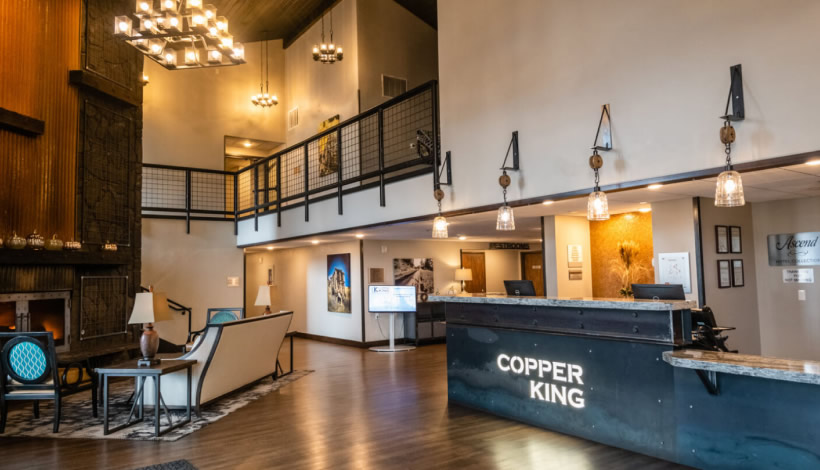In today’s hospitality space, successful hotel operations require more than just providing comfortable rooms and basic amenities. The global hospitality industry, valued at over $4.1 trillion in 2023, faces evolving guest expectations, complex operational challenges, and intense competition. From luxury resorts to boutique hotels, property owners must balance profitability with delivering exceptional guest experiences while navigating an increasingly complex business environment.
Companies like MBE Hospitality Management have emerged as leaders in this evolving landscape, demonstrating how professional management services can transform hotel operations and drive sustainable success. This comprehensive guide explores the role of hotel management companies like MBE in modern hospitality, examining the crucial elements that contribute to operational excellence and long-term value creation.
Whether you’re a hotel owner considering professional management services or simply seeking to understand the hotel business better, this guide will walk you through everything from business development to selecting the right management company for your property. We’ll explore why effective management is crucial for success, what sets leading management companies apart, and how to evaluate potential management partners who can help take your property to the next level.
- What Is A Hotel Management Company?
- Benefits of Outsourcing to Hotel Management Companies
- How Important is Hotel Management?
- What is the Most Important Thing in Hotel Management?
- What is Third-Party Hotel Management?
- Why Would a Hotel Owner Hire a Third Party Hotel Management Company?
- How Do Management Companies Manage Hotels?
- How Hotel Management Contracts Are Structured
- How to Choose a Hotel Management Company
- Conclusion
What Is A Hotel Management Company?

A hotel management company is a specialized organization that assumes comprehensive responsibility for operating and overseeing all aspects of a hotel’s daily operations on behalf of property owners. These companies bring professional expertise, established systems, and economies of scale to hotel operations, effectively bridging the gap between ownership and day-to-day management.
The scope of services provided by hotel management companies is extensive, encompassing everything from financial management to guest services. On the financial side, these companies handle budget development, revenue optimization, cost control measures, and comprehensive financial reporting. They implement sophisticated systems for asset management and long-term value creation, ensuring that properties maintain their competitive edge while maximizing returns for owners.
Operational excellence forms another cornerstone of their services, with management companies overseeing daily operations, developing standard operating procedures, and implementing quality control systems. Leading firms like MBE Hospitality Management have developed comprehensive operational frameworks that ensure consistent service delivery while maintaining the flexibility to adapt to each property’s unique needs. They also handle technology integration and maintain preventive maintenance programs to ensure smooth operations and minimize unexpected costs.
Benefits Of Outsourcing To Hotel Management Companies

By choosing a trusted partner with extensive experience, property owners gain access to sophisticated management systems and industry expertise that can transform their operations.
Human resources management is one of the primary benefits of professional hotel management, with these companies taking responsibility for staff recruitment, training, and development. Professional management companies bring proven methodologies for developing and retaining top talent, ensuring properties maintain high service standards. Their dynamic colleagues work together to create positive workplace cultures that reduce turnover and enhance service quality, while also managing performance and implementing effective training programs that keep staff engaged and productive.
The impact of professional hotel management is typically transformative, improving performance across multiple metrics. Through the implementation of sophisticated systems and proven procedures, these companies can significantly enhance operational efficiency and service delivery. Their expertise in revenue management and marketing often leads to increased RevPAR, while their established protocols help maintain consistent quality standards that improve guest satisfaction. Additionally, their economies of scale frequently result in substantial cost savings, and their experience helps properties navigate complex regulatory requirements and industry standards more effectively.
How Important is Hotel Management?

Effective hotel management is critical to a property’s success, serving as the foundation that determines whether a hotel thrives or struggles in today’s competitive marketplace. The impact of quality management extends across every aspect of hotel operations and long-term viability, influencing everything from daily guest interactions to long-term strategic planning.
Professional management plays a pivotal role through strategic planning and execution, encompassing market positioning, resource allocation, and brand development. Management teams analyze competitive landscapes, develop strategic partnerships, and plan capital improvements that enhance property value over time. This strategic approach ensures that properties remain competitive and continue to meet evolving guest expectations while maintaining operational efficiency.
Guest satisfaction stands as a primary focus of professional management, with teams working to maintain consistent service quality across all touchpoints. This involves not only implementing effective service delivery systems but also ensuring proactive problem resolution and creating enhanced guest experiences through personalized service. Well-maintained facilities and efficient operational processes further contribute to overall guest satisfaction, creating a positive cycle that drives repeat business and positive word-of-mouth.
The financial impact of professional management cannot be overstated. Through sophisticated revenue optimization strategies and careful cost management, skilled management teams can significantly improve a property’s financial performance. Their expertise often leads to enhanced property value over time, improved cash flow, and better market positioning. This becomes especially crucial during challenging economic periods, when professional management can help properties maintain stability while continuing to deliver excellent service.
Companies like MBE Hospitality Management have demonstrated the transformative power of professional management through their work with diverse property types. Their approach combines industry best practices with innovative solutions, ensuring properties achieve optimal performance while maintaining high service standards.
What is the Most Important Thing in Hotel Management?

While hotel management encompasses numerous crucial elements, guest satisfaction through consistent service excellence stands as the most important factor. This fundamental principle drives every other aspect of hotel operations and ultimately determines a property’s long-term success. Leading management companies recognize that exceptional guest experiences create sustainable competitive advantages that drive long-term profitability.
People management plays a vital role in achieving this goal. Successful hotel management requires strategic hiring practices that identify individuals with natural service orientation, coupled with comprehensive training programs that develop their skills. Clear communication channels and recognition systems that encourage excellence help maintain high service standards while fostering employee engagement. The most successful management companies invest heavily in developing their teams, recognizing that skilled and motivated staff are essential to delivering exceptional guest experiences.
Quality control systems ensure consistent service delivery across all aspects of operations. Regular audits and inspections, coupled with detailed standard operating procedures, help maintain high standards throughout the property. Proactive maintenance programs prevent service disruptions, while immediate attention to guest feedback allows for continuous improvement in service delivery. Modern management companies employ sophisticated tracking systems to monitor service quality and identify areas for improvement.
Financial acumen must be balanced with service excellence to ensure long-term sustainability. This involves strategic revenue management and cost control measures that maintain quality while optimizing financial performance. Successful managers use data-driven decision making to allocate resources efficiently and invest in improvements that enhance guest experience while delivering strong returns. Professional management companies bring sophisticated analytical tools and industry benchmarks that help properties optimize their performance while maintaining high service standards.
Innovation and adaptation have become increasingly important in modern hotel management. Leading companies continuously evaluate new technologies and methodologies that can enhance both operational efficiency and guest experience. This forward-thinking approach ensures properties remain competitive while meeting evolving guest expectations.
What is Third-Party Hotel Management?

Third-party hotel management refers to hiring an external professional management company to operate a hotel property on behalf of its owners. These specialized companies assume full responsibility for day-to-day operations, strategic planning, and overall property performance while owners maintain ownership of physical assets. This arrangement has become increasingly popular as property owners seek to leverage professional expertise while focusing on asset ownership.
The industry has evolved beyond traditional operators, with many companies now functioning as a full-service development company that can handle ground up development and construction projects. Leading hospitality groups like MBE Hospitality Management and Aimbridge Hospitality have demonstrated success across various property types and development stages.
The scope of third-party management extends across all operational aspects, including daily oversight, staff management, financial reporting, revenue optimization, and facility maintenance. These companies implement comprehensive systems for quality control and risk management, ensuring properties maintain high standards while minimizing operational risks. Companies like MBE Hospitality Management bring sophisticated management systems that have been proven across diverse property types.
The difference between third-party managed properties and owner-operated hotels is significant. Professional management companies bring broader expertise and resources, along with established operational systems that have been proven across multiple properties. Their greater purchasing power and access to enterprise-level technology solutions often result in operational efficiencies that individual owners struggle to achieve. This advantage becomes particularly important as the hospitality industry continues to evolve and become more complex.
Current industry trends show growing adoption of professional management services, driven by increasing operational complexity and the need for sophisticated technology integration. Management companies are also focusing more on sustainability initiatives and developing customized service models that address specific property needs. Market consolidation through strategic partnerships continues to shape the industry, creating stronger management organizations with enhanced capabilities.
The evolution of third-party management reflects the increasing sophistication of the hospitality industry. As properties face growing operational complexity and heightened guest expectations, the expertise and resources provided by professional management companies become increasingly valuable. Leading companies stay ahead of industry trends, implementing innovative solutions that drive performance while maintaining operational excellence.
Why Would a Hotel Owner Hire a Third Party Hotel Management Company?

Hotel owners increasingly turn to third-party management companies to optimize property performance and maximize return on investment. This decision often stems from the desire to leverage specialized expertise while focusing on asset ownership rather than daily operations. Professional management companies bring valuable resources and expertise that can significantly impact property performance.
The expertise and experience these companies bring represent a significant advantage. Access to seasoned professionals with deep industry knowledge and proven operational systems can transform property performance. Their market intelligence and experience in brand relationship management help properties maintain competitive positions while meeting brand standards efficiently. Leading firms like MBE Hospitality Management have demonstrated the ability to optimize property performance across diverse market segments.
Operational advantages include economies of scale in purchasing and operations, access to advanced technology platforms, and established training programs that enhance service delivery. These benefits typically lead to improved efficiency and better guest experiences, while standardized quality control measures ensure consistent service delivery. Professional management companies also bring sophisticated marketing and distribution strategies that can enhance market penetration and revenue generation.
Financial benefits often justify the management fees, with properties seeing improved operational efficiency and enhanced revenue generation through sophisticated management techniques. Better cost control measures and access to beneficial vendor relationships frequently result in significant savings, while professional risk management helps protect the owner’s investment. Leading management companies demonstrate consistent ability to improve property performance and value over time.
How Do Management Companies Manage Hotels?

Professional management companies employ a comprehensive, systematic approach combining strategic oversight with detailed attention to daily operations. Their methodology encompasses multiple layers of responsibility working in concert to ensure optimal property performance. Companies like MBE Hospitality Management have developed sophisticated management systems that address all aspects of hotel operations.
Day-to-day operations form the foundation of their management approach. Management teams implement standardized operating procedures that ensure consistent service delivery while maintaining flexibility to address unique situations. They coordinate staff scheduling, monitor service quality, and manage vendor relationships, ensuring smooth operations across all departments. Professional management companies bring proven systems that enhance operational efficiency while maintaining high service standards.
Strategic planning guides long-term success, with management companies developing comprehensive plans for market positioning, competitive response, and brand development. They create detailed business plans that outline revenue targets and operational improvements while maintaining flexibility to adapt to changing market conditions. Leading companies employ sophisticated market analysis tools to identify opportunities and optimize property performance.
Performance monitoring systems track key metrics and identify areas for improvement. Management companies analyze RevPAR, occupancy rates, and guest satisfaction scores to make data-driven decisions about resource allocation and strategic initiatives. Regular reporting keeps owners informed while ensuring accountability for results. Modern management systems provide real-time performance data that enables quick response to changing market conditions.
Modern information technology solutions play an increasingly important role in hotel management, with professional management companies implementing sophisticated property management systems, revenue management tools, and customer relationship platforms that enhance operational efficiency and decision-making capabilities. Professional management companies implement sophisticated property management systems, revenue management tools, and customer relationship platforms that enhance operational efficiency and decision-making capabilities. Leading firms stay ahead of technological trends, implementing innovative solutions that drive performance improvement.
How Hotel Management Contracts Are Structured

Management contracts define the relationship between property owners and management companies, establishing clear expectations, responsibilities, and compensation structures. These agreements form the foundation of successful partnerships in hotel operations. Professional management companies work to create balanced agreements that protect both owner and operator interests.
Fee structures typically combine base fees with incentive compensation. Base fees usually range from 2-4% of gross revenue, providing steady income for basic management services. Incentive fees, often calculated as 8-12% of gross operating profit, reward exceptional performance and align management company interests with owner objectives. Leading companies like MBE Hospitality Management structure their agreements to ensure alignment of interests between owners and operators.
Performance requirements ensure accountability, with contracts specifying targets for metrics such as RevPAR index, guest satisfaction scores, and profit margins. Regular reporting requirements allow owners to monitor progress and hold management companies accountable for meeting established goals. Professional management companies provide sophisticated reporting systems that offer transparency and accountability.
Contract terms typically range from 5-20 years, with provisions for extensions based on performance. These agreements include clearly defined owner rights regarding approval of major decisions and access to property information. Termination clauses protect both parties’ interests by specifying conditions under which the contract can be ended. Well-structured agreements provide flexibility to adapt to changing market conditions while maintaining stable operating relationships.
How To Choose A Hotel Management Company

Selecting the right hotel management company represents a critical decision that significantly impacts property success. This choice requires careful consideration of multiple factors and thorough due diligence to ensure alignment with ownership objectives. Leading companies demonstrate consistent performance improvement across their managed properties.

Experience and expertise should be evaluated carefully, looking at the company’s track record with similar properties and their knowledge of relevant market segments. Financial stability and operational capabilities deserve close scrutiny, including assessment of their technology systems, training programs, and quality control measures. Companies like MBE Hospitality Management have demonstrated expertise across diverse property types and market segments.

Cultural fit plays a crucial role in long-term success. The management company’s communication style, values, and problem-solving approach should align well with ownership priorities. Their long-term vision for the property should complement owner objectives while demonstrating flexibility to adapt to changing market conditions. Professional management companies work to create strong partnerships with owners based on shared objectives and clear communication.

The selection process should include thorough reference checks and site visits to properties under the company’s management. Detailed review of performance data and fee structures helps ensure the relationship will deliver value, while evaluation of support systems confirms the company’s ability to meet property needs effectively. Leading management companies welcome this due diligence, demonstrating transparency and confidence in their capabilities.
Conclusion

The future of hotel management continues to evolve with advancing technology, changing guest expectations, and new operational challenges. Success requires sophisticated management approaches that balance efficiency with guest satisfaction while adapting to industry changes. For property owners seeking to optimize their investments, partnering with a professional management company offers a proven path toward enhanced performance and long-term value creation.
MBE Hospitality Management combines proven expertise with innovative approaches to property optimization. Our track record of success across diverse property types demonstrates our ability to deliver exceptional results while maintaining high service standards. Property owners seeking to enhance their operational performance and maximize investment returns should contact MBE Hospitality Management to explore how we can transform property performance.
